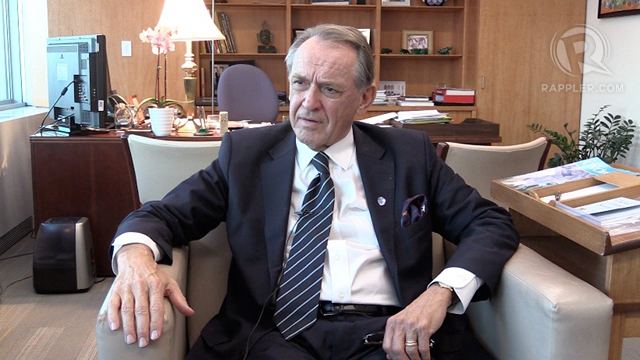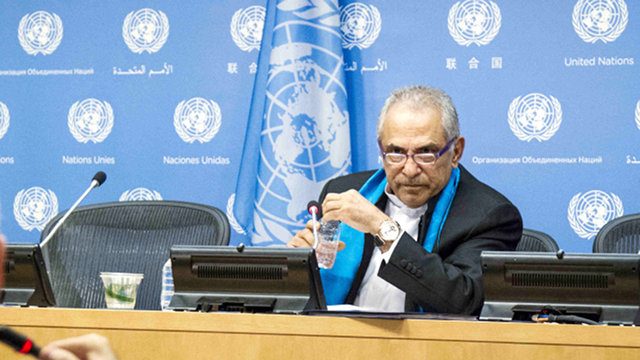SUMMARY
This is AI generated summarization, which may have errors. For context, always refer to the full article.

UNITED NATIONS – A major review of United Nations peacekeeping will prioritize an issue that the Philippines repeatedly highlights: the safety of troops during kidnapping and siege incidents.
In an exclusive interview with Rappler, UN Deputy Secretary-General Jan Eliasson said that blue helmets’ security will be a key focus of the high-level independent review of peace operations, the first in 15 years.
Eliasson discussed the topic with the review panel led by former Timor-Leste President and Nobel laureate Jose Ramos-Horta in a meeting on Tuesday, November 18. UN chief Ban Ki-Moon ordered the review and appointed the panel members.
“The safety of the peacekeepers will certainly feature very high on the agenda of the panel. Because we are asking them to analyze the new environment in which peacekeeping operations are taking place, and that environment is so much more complicated,” Eliasson said in an interview at the UN Headquarters in New York.
Rappler asked Eliasson how the panel will consider the concerns of troop-contributing countries like the Philippines, whose peacekeepers pulled out of the Golan Heights after two kidnapping incidents last year, and a firefight with the Al-Qaeda-linked Al Nusra Front in August.
The UN’s second highest-ranking official said that the review will include a “dialogue” with the troop contributors, mostly developing nations.
“They are an independent review panel but judging from the composition of that panel, I feel very comfortable that they will not avoid any sensitive issues,” he said.
The Philippines is one of the oldest and top troop-contributing countries in UN peacekeeping. Yet kidnappings and the controversy over the August standoff led Manila to question the UN’s handling of peacekeeping, and the Golan mission commander’s alleged order for the troops to surrender their arms to terrorists.
In October, President Benigno Aquino III criticized the UN for giving Filipino peacekeepers “mission impossible,” citing the presence of terrorists, and the lack of weapons for troops.

‘Stronger voice for troop contributors’
A Swedish diplomat and mediator working with the UN for 3 decades, Eliasson said that the world body acknowledged the concerns of troop contributors about the drastic changes in peacekeeping, and the toll this takes on peacekeepers.
There are 16 UN peacekeeping missions worldwide composed of a record 130,000 personnel. US Ambassador to the UN Samantha Power said that two-thirds of peacekeepers operate in active conflict areas, the highest percentage ever. (READ: UN peacekeepers facing ‘complex challenges’)
These blue helmets have to contend with violent extremist and terrorist groups. Besides forces in the Golan Heights, peacekeepers in the West African nation of Mali are repeatedly targeted in attacks that killed over 30 blue helmets in the past year.
‘I think it’s fair that the troop-contributing countries have a stronger voice in the discussions about peacekeeping operations.’
– Jan Eliasson, UN Deputy Secretary-General
“Many, many years ago, it was automatically assumed that the UN would be a neutral, impartial body and accepted by all parties as impartial and neutral,” Eliasson said. “That is almost the exception in today’s world where you deal with so-called asymmetrical threats: terrorist groups, groups that have not given up arms. We will have to have a capacity to deal with almost combat situations.”
In building the capacity of peacekeepers, the UN official said that issues on budget and equipment must be resolved. Developed countries usually contribute funding for UN peacekeeping while developing nations deploy troops, police and staff. (READ: Biden to UN: We owe peacekeepers more)
Eliasson contrasted the “low-budget” operations of the UN with that of the world’s best militaries, saying the international organization spends only 25% on a peacekeeper compared to what America does for a US soldier in Iraq or Afghanistan.
“We don’t have the equipment level that we should have, and I think the troop-contributing countries have the right to expect that help. I think that the member-states, particularly the members of the Security Council, need to really make sure that we have the resources that are compatible with the mandates and the environment by which we work.”
The deputy UN chief said he understood the position of troop contributors, having been foreign minister of Sweden, and the Swedish ambassador to the UN. He also became president of the UN General Assembly, the UN’s chief deliberative, policymaking and representative organ composed of all 193 member states.
“I think it’s fair that the troop-contributing countries have a stronger voice in the discussions about peacekeeping operations. I’ve been in the General Assembly saying, ‘We as troop contributors want to have a voice,’ and I find that reasonable. We need to have a dialogue, more so as the dangers now grow.”
He added, “I think it will be a very important and difficult dialogue with the troop contributors.”
More women to assess peacekeeping
On top of the safety of peacekeepers, the review panel is tasked with looking into issues like the changing mandates of peacekeeping missions, managerial and administrative arrangements, and human rights and the protection of civilians.
When Ban announced the composition of the panel in October, he named 14 members, with only 3 out of them women. The panel’s composition drew criticism from journalists and observers.
The choice was made despite the UN’s advocacy for the deployment of female peacekeepers, with the belief that they inspire women and girls in male-dominated societies to push for their rights and participate in peace processes.
Eliasson told Rappler that the UN will now increase women’s participation in the peace operations review.
Radhika Coomaraswamy of Sri Lanka was appointed ex-officio member of the panel. She is leading the review of a UN Security Council resolution on Women, Peace and Security. The panel also vows to engage with partners like UN Women, and the Nobel Women’s Initiative.
“We will have contact with some very important women who have been dealing with peacebuilding and peacemaking. It’s an improvement. I admit: it’s an improvement that perhaps should have been done from the beginning,” Eliasson said. – Rappler.com
Rappler multimedia reporter Ayee Macaraig is a 2014 fellow of the Dag Hammarskjöld Fund for Journalists. She visited New York and Washington DC to cover the UN General Assembly, foreign policy, diplomacy, and world events.
Add a comment
How does this make you feel?
There are no comments yet. Add your comment to start the conversation.